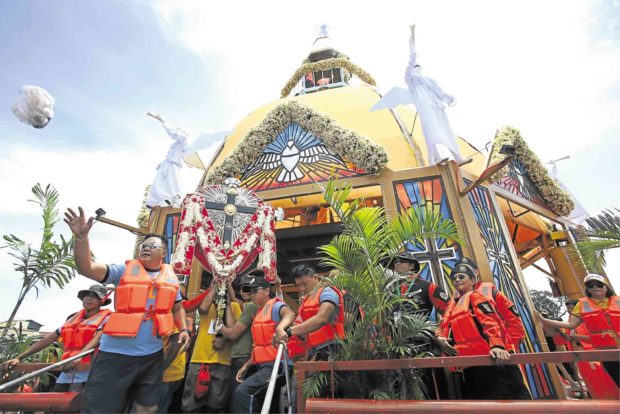
Residents join the annual “Holy Cross of Wawa” fluvial parade on the Bocaue River where 24 years ago 270 people died when the pagoda overturned. —NIÑO JESUS ORBETA
BOCAUE, Bulacan — The floating pagoda, carrying a venerated wooden cross called the “Mahal na Poon ng Krus sa Wawa,” sailed for the fourth time around Bocaue River on Sunday.
This year’s pagoda was shaped like the Brunelleschi Dome of the Santa Maria del Fiore Cathedral in Florence, Italy.
The 16-meter-tall and 13-m-wide (54-foot-tall and 44-ft-wide) pagoda left the docks in Barangay Bambang past 10 a.m., carrying some 250 devotees and a band, for the annual fluvial procession around the river.
It rained at noon, but the pagoda completed its four-hour river tour and devotees returned the cross to the St. Martin of Tours Church, the town’s parish church. The annual procession takes place on the first Sunday of July, but it was rescheduled to July 9 instead.
In his homily at the St. Martin of Tours before the pagoda set sail, Bishop Jose Oliveros of the Malolos Diocese said the annual event should be remembered for its Catholic relevance, and not just as a cultural event, because the pagoda carries the symbol of the death and sacrifice of Jesus Christ.
Like Christ, he said, everyone carries crosses in life which was what the Krus sa Wawa represents, Oliveros said.
Editha Cruz, chair of the organizing committee, said this year’s procession offers prayers and expresses gratitude for the good fortunes benefiting Bocaue and the whole Christian world.
“That very strong faith of the people was again seen and felt,” based on the huge number of devotees and tourists who joined the event, she said.
The wooden relic was supposedly discovered floating along the Bocaue River section called Wawa hundreds of years ago at the boundaries of the towns of Bocaue and Bulakan.
Bocaue devotees kept the cross at the town’s parish church which was dedicated to St. Martin of Tours, said Regino dela Fuente, one of the organizers.
The procession was stopped when the pagoda collapsed on July 2, 1993, killing 270 people.
The procession was revived in 2014, but the event required stricter protocols. Every passenger is screened and listed down. Organizers are required to make sure every passenger has a designated life vest. Police and emergency response units were also required to be present in the area whenever the pagoda sets sail.